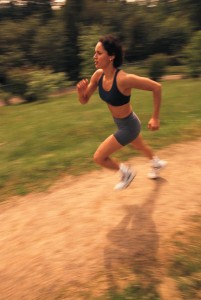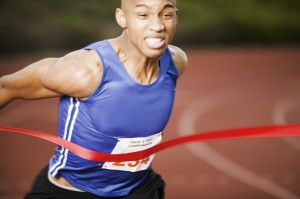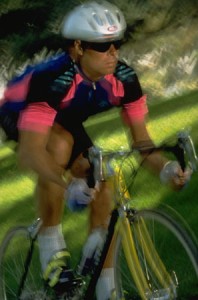 Running is a fascinating sport to me because nearly anyone can run and it can be done at almost any stage in life. Of course, not everyone likes to run and there are many other sports that welcome athletes of all levels with open arms. I have a number of friends who consider themselves beginner runners and I know plenty of people who hate running but love biking, lacrosse, swimming, tennis, pilates, and every sport in between. In trying to define what kind of athlete I am, I also find myself asking what kind of athlete to I want to be. I have always considered myself a runner at an intermediate level with middle distances as my preferred “natural selection.” However, in recovering from ITBS, I have found myself trying to become a more diverse athlete.
Running is a fascinating sport to me because nearly anyone can run and it can be done at almost any stage in life. Of course, not everyone likes to run and there are many other sports that welcome athletes of all levels with open arms. I have a number of friends who consider themselves beginner runners and I know plenty of people who hate running but love biking, lacrosse, swimming, tennis, pilates, and every sport in between. In trying to define what kind of athlete I am, I also find myself asking what kind of athlete to I want to be. I have always considered myself a runner at an intermediate level with middle distances as my preferred “natural selection.” However, in recovering from ITBS, I have found myself trying to become a more diverse athlete.
One interpretation of the question of “what kind of athlete are you?” is about how you perform as an athlete rather than whether you are a walker, runner, weight lifter, biker, etc. Are you a casual athlete? Consistent, competitive, weight-loss driven, diverse in your sports, beginner at everything, advanced in something? Again, I always put myself in this “runner” bubble at the self-appointed intermediate level, but the more I think about it, the less I know how to answer the question of what I want to be. I love running but I don’t know that I want to be an elite runner. I don’t feel compelled to try to win any of the races I enter, but I do want to consistently improve my personal records. I also don’t want to lose the joy found in simply going for a run.
In the hopes of adding a triathlon or two to my race schedule, I’d also like to become a biker and understand proper form, performance, and training as it relates to cycling. There is no doubt that I am a beginner biker and despite the fact that I can swim, I would place myself at the below-beginner level of swimming, if such a category exists.
Novice, Intermediate, Advanced, Elite
 If you feel compelled to label yourself or put yourself in some sort of athletic bucket, the terms that come to mind as far as levels are concerned are novice/beginner, intermediate, advanced, elite/ultra, and of course, Olympic. These terms tend to be used more to define someone’s performance as it relates to regular exercise and training, but I think there is more to it. For example, I know people who are athletically inclined and have the ability to run a race at an advanced, fast-paced level, but who don’t necessarily train to do so.
If you feel compelled to label yourself or put yourself in some sort of athletic bucket, the terms that come to mind as far as levels are concerned are novice/beginner, intermediate, advanced, elite/ultra, and of course, Olympic. These terms tend to be used more to define someone’s performance as it relates to regular exercise and training, but I think there is more to it. For example, I know people who are athletically inclined and have the ability to run a race at an advanced, fast-paced level, but who don’t necessarily train to do so.
I was talking with a friend who recently started running and who would like to train for her first race. She did not grow up as an athlete and hasn’t really done much running so much of the sport and training is new to her. As a novice both to running and being athletic, she naturally has lots of questions that center around a beginner level of running. When I started thinking about where I turn to for information, I realized that much of what I find I understand only because I have some experience. If I were a beginning runner, I would have no idea where to look short of a generic Google search and I would be easily overwhelmed by all the terminology on various running websites. If you have any recommendations for beginning runners, please feel free to share them.
 As a novice cycler, I feel the same way about biking as my friend does about running. Where do I start? How do I determine what kind of bike I might need? How far should I be able to ride in 30 minutes and what is considered a decent pace? Is the stationary bike like a treadmill when it comes to comparing indoor and outdoor biking? My biking questions are endless and no doubt label me as a novice biker despite the fact that I consider myself to be an intermediate athlete overall.
As a novice cycler, I feel the same way about biking as my friend does about running. Where do I start? How do I determine what kind of bike I might need? How far should I be able to ride in 30 minutes and what is considered a decent pace? Is the stationary bike like a treadmill when it comes to comparing indoor and outdoor biking? My biking questions are endless and no doubt label me as a novice biker despite the fact that I consider myself to be an intermediate athlete overall.
The advanced level of sports is one that I find desirable; it’s a place I want to be, and for now I am comfortable with the long-term goal of becoming an advanced runner. In my mind, this means achieving my desired 8-minute/mile pace for at least a 10-mile run. For some reason, it means to me running several half marathons and perhaps a marathon every year. It means training on a regular basis and racking up the miles in my training log, though I don’t know for sure what an “advanced” runner’s log should look like. The trick for me in becoming an advanced runner is that I need to be fully recovered and will basically be starting back at a beginner level of training. Now that I am starting to think more about the kind of athlete I’d like to be, I will need to start planning races accordingly so that I can develop my beginner level biking skills while building on my existing level of running.
In writing all this, I still feel somewhat conflicted about answering the question “what kind of athlete am I?” I also feel a little confused about the various novice to elite buckets and whether or not it’s even necessary to fall into one category or another. I’d love your thoughts on this.
What I know right now is that the kind of athlete I am today is not the kind of athlete I will be a year from today. I range from beginner to intermediate with the hopes of becoming advanced. I am experimental in my sports, goal-oriented most of the time, and still like to go for a leisurely run with the dog every now and then.

Love it!!
I love the fact that while analyzing the “type of athlete” you may be, you don’t lose sight of what is truly important: enjoyment of the sport. Whether someone is beginning, intermediate, or advanced the best part of athleticism is the ability to take pleasure in the activity itself.